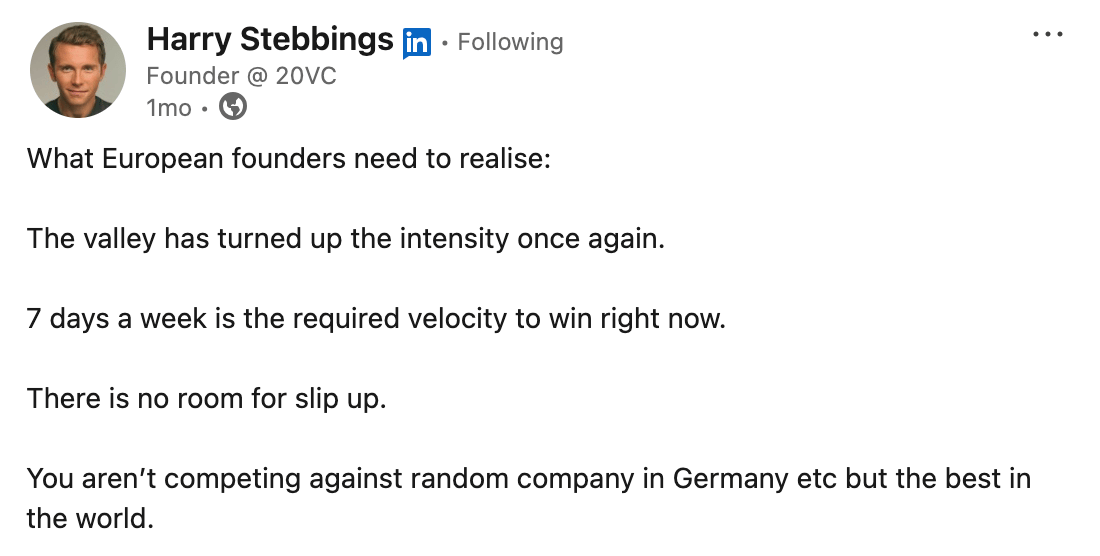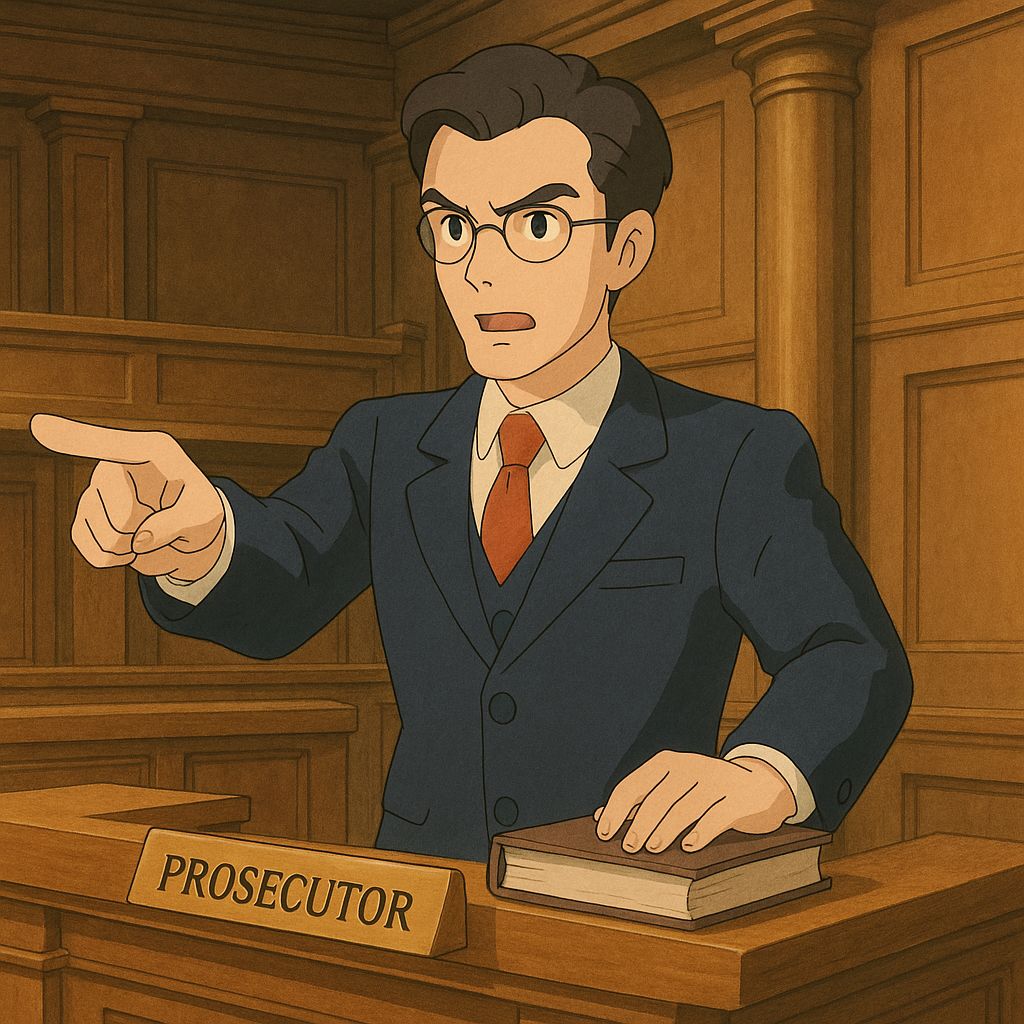- The Uncommon Founder
- Posts
- The Uncommon Founder #18
The Uncommon Founder #18
The Detective and The Prosecutor - a tale of intensity
You see but you do not observe. The distinction is clear.
The Detective and The Prosecutor - a tale of intensity
At an event recently I found myself mediating a debate between two people about ‘intensity’. They quickly sparred on working hours, differences between Europe and the US, measures of success, and whether or not a common way of doing things means a right way of doing things.
It was fiercely contested as they traded blows, but like two heavyweight boxers, the longer the contest continued, the more sharp, well-judged jabs were replaced with lazy flails that missed the mark, and it became apparent that no conclusive blow would land.
The challenge relates to definition - intensity becomes a proxy for 996 working hours, founder mode, in-office vs. remote, performance culture, leadership style and plenty of ill-judged Linkedin content. And without a clear agreement of what we’re even talking about, the whole debate feels a bit pointless.
I do believe intensity, as I’ll come on to define it, plays an important role in founder and organisational success. But intensity is to a founder what a scalpel is to a surgeon - an important tool for the job, that if wielded unskilfully, is most likely to cause casualties.
The essence of skilful founder leadership, as I see it, is the task of translating founder intensity into positive cultural intensity - a drive for speed and excellence that is shared and embedded in the soul of the organisation.
That translation is an ever-ongoing process borne of many decisions, actions and processes, but above all, the manner in which a founder channels their intensity sets the tone for the organisation. Detectives channel their intensity into a high energy, passionate, curiosity in search of the truth, which in turn fosters positive cultural intensity. While Prosecutors channel it into an obstinate, punitive and oppositional approach, devoted to being right, that most often festers into fear, blame and poor decision-making.
And which a founder embodies is an important choice to make.
What is intensity?
Intensity as a Founder attribute
I have worked with lots of different founders and I’ve seen many flavours of intensity. When I boil those insights down, I define intensity as a dialled up combination of:
Restlessness - an inability to sit still (in a metaphorical sense) which fuels a yearning to build.
Curiosity - a highly inquisitive nature coupled with a thirst for learning.
Energy - to convert the above into action and persistence.
There are many public examples of intensity (good and bad), but I’m always impressed by the Collison brothers at Stripe, who exude passion, curiosity and humility in equal measure.
There has been no period in Stripe’s history when we have not been fixated on hiring really talented people and those people have made major contributions. With lots of companies that talent story gets undersold.
Notably, founder intensity is not, in my opinion, a specific work schedule.
I take it as given that Founders are ‘always on’. The all consuming nature of the role, plus the attributes of intensity, mean that - whether in the shower, walking the dog, or watching TV - some part of a Founder’s brain is usually processing work.
Some founders display that ‘always-on-ness’ in performative ways - like sleeping under desks, or posting about working at the weekend - but most are just quietly getting on with it.
So when investors like Harry Stebbings post the below, I find it dumb for a number of reasons, not least because he’s essentially a land dweller describing water to the fish.

Intensity as a cultural attribute
Beyond the Founder, we can think about intensity at the organisational-level. Companies can be ‘intense’ in very toxic ways, with a culture of fear, blame and chaotic dysfunction; or in positive ways with a collective commitment to speed and excellence.
In my career prior to coaching, I experienced a range. At ebay, for example, I was very aware of (and frustrated by) the fact that I was part of a public behemoth of a company where everything took a long time to get done, often for no apparent reason. It definitely wasn’t a toxic culture - people treated each other well on the whole - but nor did it have intensity.
Contrast that to GoCardless, where the expectation was that big things could and should be done rapidly and to a high standard, and generally they were. Head upstream and you’d find the original source of the intensity originated from Hiroki, the Founder CEO, who embodied intensity in everything he did, not least when he ended up in a wheelchair for life after a horrific cycling accident and was back running the company within 3 months. But as the company grew he made sure that that intensity didn’t solely live with him. Carlos for example, who I reported up into in his role as CPTO before he moved to COO, was famous for his ability to delve into the finest detail of any product or engineering initiative discussed in quarterly planning. You knew going into that room that he wasn’t going to shout or scream or treat anyone badly, but he would ask all the right questions until he understood the underlying thinking and believed that you did too. There was just no way you were going in underprepared and there’s no doubt in my mind that it drove an extremely high calibre of work.
So I’ve felt firsthand the difference between cushty cultures and intense ones (and toxic ones too although that’s a story for another day.) But so what? You might ask.
Does intensity lead to success?
There is no perfect data or definitive study out there which quantifies the link between intensity and success. I, like everyone else, am pattern-matching based on my own experience.
But I’ve come to believe that, if we take success in the very narrow startup sense as opposed to the grand meaning of life, then founder intensity is a pre-cursor for success for a few reasons:
Intensity as self-selection - simply put, being a Founder is hard, and most people who knowingly sign up to that journey have an intensity that drives them to do so. Lower intensity people are less likely to take on that particular challenge.
Intensity as persistence - most startups fail because people give up. Even plenty of those that seem to fail for other reasons, like running out of money, have actually done so because people gave up. Intensity serves as important fuel to keep going when the hard times inevitably arise.
Intensity attracts money - startups need money and investors tend to invest in those they believe display intensity. This is equal parts rational strategy focused on an important founder attribute, and investor as herd animal betting on what they think other investors will like in future.
And cultural intensity, in its positive form, is equally important:
Intensity as collective urgency - startups have a limited time to convert investor money into something tangible. In the absence of positive cultural intensity things just don’t tend to happen quickly enough.
Intensity as hard work - almost everyone who works at a startup could likely earn more money and have more free time working elsewhere. Positive cultural intensity is what allows startups to sustainably do more with less.
But let me be clear. Our biggest assets can also be our biggest liabilities, and this, I think, is true of intensity.
It can be a magnetic force that creates alignment in the world around it; or a repellent force of narcissism, control and arrogance.
It can be a well of energy for the founder and those around them; or a sink for energy and motivation to pour down.
It can create an expansive environment for people to do their best work; or a climate of fear that hampers performance.
Whether intensity becomes a major asset or major liability depends in large part on how a founder leads.
Translating founder intensity into positive cultural intensity
There are two archetypes of intensity I see often: the Detective and the Prosecutor. I believe that all founders (and all leaders for that matter) have the capacity to embody either, but will tend towards a default mode according to the context.
To put it simply - in my experience Detectives far outperform Prosecutors in their ability to translate their own intensity into positive cultural intensity.
The Detective

Prioritises: the mission.
Values: truth.
Tends to: ask lots of curious questions, listen intently, learn quickly, communicate transparently, take personal accountability.
Stance: collaborative (you’re both on the same side of the table).
Others view them as: a role model.
Treats others as: an asset.
The Prosecutor

Prioritises: their ego.
Values: being right.
Tends to: talk more than they listen, discount information that doesn’t align with their beliefs, learn slowly, blame others.
Stance: oppositional.
Others view them as: someone to be feared.
Treats others as: a liability or inconvenience.
So intensity is neither all good nor all bad. An absence of it is likely to hold a startup back, or perhaps prevent it from ever forming to begin with; but the presence of it is not a guarantee of success. Founders who channel their intensity as a Detective are more likely to instil a culture of positive intensity within their teams, whilst Prosecutors, if they’re lucky, may have success in spite of their approach.
The choice of mode is really up to you.
Worth reading this week
Flounder Mode felt like a warm bath for my soul as I read it. A welcome antidote to the linear, goal-oriented visions of success we often unquestioningly hold onto.
For anyone drowning in a sea of ‘AI will take all our jobs’ articles, this thoughtful piece from Sari Azout includes some great insights on how she’s changed her thinking about what AI is.
Elena Verna’s post about AI-native employees is refreshing - mostly because its rooted in her real experience at Lovable, the World’s fastest growing software company
An important reminder of the very real advances that make human lives better being made out there - in this case gene therapy to restore hearing